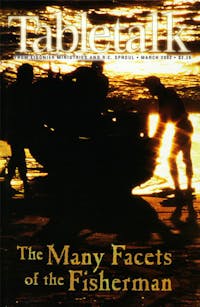
Request your free, three-month trial to Tabletalk magazine. You’ll receive the print issue monthly and gain immediate digital access to decades of archives. This trial is risk-free. No credit card required.
Try Tabletalk NowAlready receive Tabletalk magazine every month?
Verify your email address to gain unlimited access.
One of the beauties of the Bible is that it presents people as they really were. Under inspiration, the Biblical authors did not ignore their heroes’ faults but presented them as the flawed but faithful people they were. Perhaps no other New Testament figure is a better example of this than Simon Peter. His successes and failures truly demonstrate the process of growth that all Christians are called to experience in order to be effective in building Christ’s kingdom.
In Footprints of the Fisherman, Carol Ruvolo takes the reader through a study of Peter’s life. In addition to traditional focus points such as Peter’s confession and denial of Christ, she highlights other events in Peter’s life that are discussed less often in modern preaching and teaching. The reader thus comes to understand just how much Peter learned—and often forgot—as he followed Christ.
After an introduction, each chapter focuses on an event in Peter’s life. In addition to the passage that details the event, Ruvolo gives related verses so the reader will better understand what the whole canon has to say about the incident.
Ruvolo’s earnest desire is that her readers would be changed by the power of the Scriptures, and this is most evident in the well-thought-out questions that conclude each chapter. These help the reader focus carefully on the important themes that emerge from each episode in Peter’s life.
Each chapter also includes detailed application questions. Ruvolo encourages readers to think about specific ways to apply Scripture to life and urges them to think through applications with church leaders and other mature Christians. A “Digging Deeper” section provides the option for further study incorporating other books and people.
Overall, the reader is left with a rather complete and realistic view of Peter and, thus, a clearer picture of the nature of growth in Christ. Ruvolo’s book, which is published by Deo Volente Publishing, helps us see that we can learn much from Peter because he was so much like us.
